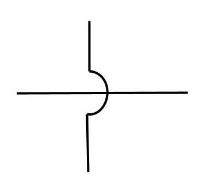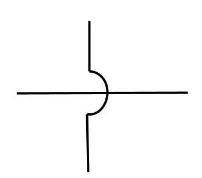
What do the following circuit symbols represent?


Answer
500.7k+ views
Hint: Connecting lines crossed in older electrical drawings, whereas non-connecting wires “jumped” over each other with small half-circle marks. Connecting wires are joined with a dot in newer electrical diagrams, while non-connecting wires are crossed without a dot. Some people, on the other hand, continue to connect wires crossing with no dot, which might lead to confusion.
Complete answer:
The above symbol denotes that the two wires are not connected in any way. As depicted in the diagram below. When there are two or more wires in a circuit, this symbol is used.

When there are two or more wires in a circuit, this symbol is used.
Additional information: The connections between leads used to be simple line crossings. The connection of two intersecting wires was depicted by a crossing of wires with a "dot" or "blob" to signify a link before the arrival of computerised drafting. Simultaneously, the crossover was simplified to be the same as before, but without the "dot."
However, if the dot was painted too small or omitted accidently, it could cause confusion between the wires that were connected and those that were not. As a result, the modern standard for showing a 4-way wire connection is to draw a straight wire and then stagger the other wires along it with "dots" as connections, resulting in two distinct T-junctions that are clearly not a crossover.
Note: For insulated crossing wires, the CAD symbol is the same as for non-insulated crossing wires, which is an older, non-CAD sign. To avoid confusion, non-CAD schematics should use the wire "jump" (semi-circle) symbol for insulated wires (rather than the CAD-style symbol for no connection), to avoid confusion with the original, earlier style symbol, which means the exact opposite. Staggering the joining wires into T-junctions is the newer, suggested approach for 4-way wire connections in both CAD and non-CAD schematics.
Complete answer:
The above symbol denotes that the two wires are not connected in any way. As depicted in the diagram below. When there are two or more wires in a circuit, this symbol is used.

When there are two or more wires in a circuit, this symbol is used.
Additional information: The connections between leads used to be simple line crossings. The connection of two intersecting wires was depicted by a crossing of wires with a "dot" or "blob" to signify a link before the arrival of computerised drafting. Simultaneously, the crossover was simplified to be the same as before, but without the "dot."
However, if the dot was painted too small or omitted accidently, it could cause confusion between the wires that were connected and those that were not. As a result, the modern standard for showing a 4-way wire connection is to draw a straight wire and then stagger the other wires along it with "dots" as connections, resulting in two distinct T-junctions that are clearly not a crossover.
Note: For insulated crossing wires, the CAD symbol is the same as for non-insulated crossing wires, which is an older, non-CAD sign. To avoid confusion, non-CAD schematics should use the wire "jump" (semi-circle) symbol for insulated wires (rather than the CAD-style symbol for no connection), to avoid confusion with the original, earlier style symbol, which means the exact opposite. Staggering the joining wires into T-junctions is the newer, suggested approach for 4-way wire connections in both CAD and non-CAD schematics.
Recently Updated Pages
Master Class 10 Computer Science: Engaging Questions & Answers for Success

Master Class 10 General Knowledge: Engaging Questions & Answers for Success

Master Class 10 English: Engaging Questions & Answers for Success

Master Class 10 Social Science: Engaging Questions & Answers for Success

Master Class 10 Maths: Engaging Questions & Answers for Success

Master Class 10 Science: Engaging Questions & Answers for Success

Trending doubts
What is the median of the first 10 natural numbers class 10 maths CBSE

Which women's tennis player has 24 Grand Slam singles titles?

Who is the Brand Ambassador of Incredible India?

Why is there a time difference of about 5 hours between class 10 social science CBSE

Write a letter to the principal requesting him to grant class 10 english CBSE

A moving boat is observed from the top of a 150 m high class 10 maths CBSE




